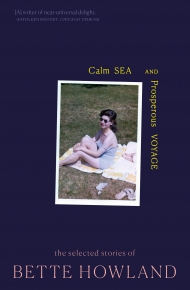The Beach
News • July 20, 2018
These July days we are either on the beach, or at our desks dreaming about it. Our new collection of features from the archive is also in a summer mood: from beach vacations to seaside journeys, these pieces are unlocked and open for all to read in the coming weeks:
"Journey Along the Sea Road," the observations, poems, and recollections of a Buddhist monk who went sightseeing along the Tōkaidō—the great road linking Kyoto and Tokyo—in the thirteenth century. Meredith McKinney's translation of a work that launched the literary travel journal as a genre was featured in APS No. 26: “Each one of us / may run our different course / yet that road we run on / is the same for all.”
"Holy Week Vacation," from APS No. 16, Guillermo Fadanelli's account of a family’s trip to Acapulco and the return home: “Classes will begin again on Monday: my brother will be like my father and my sister will have a life similar to my mother’s. I, as soon as I can, will clear out of here.” Unlike the narrator, the author—who was born in Mexico City in a hospital that is now a hotel—has stayed—drawn to the city “as if by a magnet.”
Pierre Reverdy's poems, written in the final days of World War II and “almost mystical in their effect,” says Paul Auster; “the poet seems to evaporate, to vanish into the haunted country he has created." Dan Bellm’s translations of the French poet’s work appeared in APS No. 17.
"Mariner" (APS No. 09) by Jennifer Chang, whose poems “explore the shifting boundaries between the outer world and the self.”
"We Are Holding Our Own," Megan Cummins’s story from APS No. 17 of a small town on Lake Huron, a place of both isolation and protection, where "all that vanished time rattled around inside...like engine knock."
Plus Martha Cooley on the Costa Concordia, "a blue-and-yellow hallucination" outside her window; and work from Mark Bibbins, Lea Carpenter, Patricia Engel, Stefania Heim, and Major Jackson.
"Journey Along the Sea Road," the observations, poems, and recollections of a Buddhist monk who went sightseeing along the Tōkaidō—the great road linking Kyoto and Tokyo—in the thirteenth century. Meredith McKinney's translation of a work that launched the literary travel journal as a genre was featured in APS No. 26: “Each one of us / may run our different course / yet that road we run on / is the same for all.”
"Holy Week Vacation," from APS No. 16, Guillermo Fadanelli's account of a family’s trip to Acapulco and the return home: “Classes will begin again on Monday: my brother will be like my father and my sister will have a life similar to my mother’s. I, as soon as I can, will clear out of here.” Unlike the narrator, the author—who was born in Mexico City in a hospital that is now a hotel—has stayed—drawn to the city “as if by a magnet.”
Pierre Reverdy's poems, written in the final days of World War II and “almost mystical in their effect,” says Paul Auster; “the poet seems to evaporate, to vanish into the haunted country he has created." Dan Bellm’s translations of the French poet’s work appeared in APS No. 17.
"Mariner" (APS No. 09) by Jennifer Chang, whose poems “explore the shifting boundaries between the outer world and the self.”
"We Are Holding Our Own," Megan Cummins’s story from APS No. 17 of a small town on Lake Huron, a place of both isolation and protection, where "all that vanished time rattled around inside...like engine knock."
Plus Martha Cooley on the Costa Concordia, "a blue-and-yellow hallucination" outside her window; and work from Mark Bibbins, Lea Carpenter, Patricia Engel, Stefania Heim, and Major Jackson.
Back to Top
Categories
Archive
About
A Public Space is an independent, non-profit publisher of the award-winning literary and arts magazine; and A Public Space Books. Since 2006, under the direction of founding editor Brigid Hughes the mission of A Public Space has been to seek out and support overlooked and unclassifiable work.
Featured Title

"A ferocious sense of engagement... and a glowing heart." —Wall Street Journal
Current Issue

Subscribe
A one-year subscription to the magazine includes three print issues of the magazine; access to digital editions and the online archive; and membership in a vibrant community of readers and writers.
Newsletter
Get the latest updates from A Public Space.
